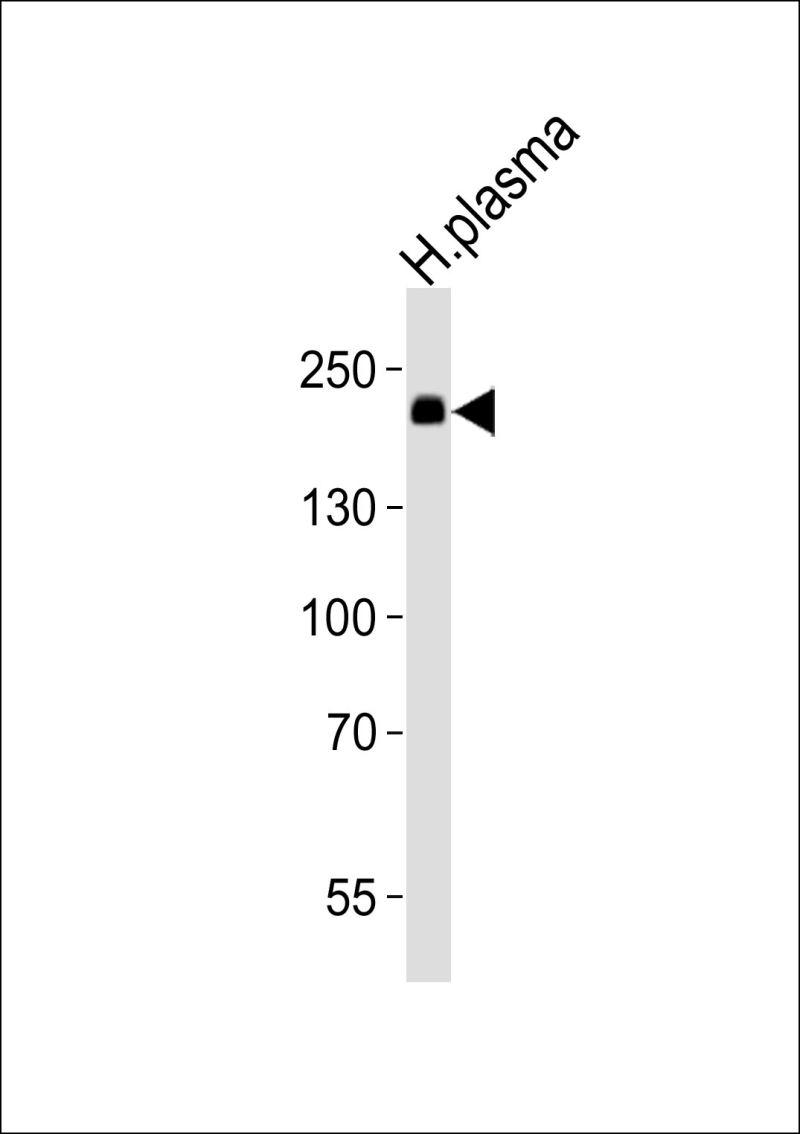
| WB | 1/1000 | Human,Mouse,Rat |
| IF | 咨询技术 | Human,Mouse,Rat |
| IHC | 咨询技术 | Human,Mouse,Rat |
| ICC | 技术咨询 | Human,Mouse,Rat |
| FCM | 咨询技术 | Human,Mouse,Rat |
| Elisa | 咨询技术 | Human,Mouse,Rat |
| Aliases | Attractin, DPPT-L, Mahogany homolog, ATRN, KIAA0548, MGCA |
| Entrez GeneID | 8455 |
| WB Predicted band size | 158.5kDa |
| Host/Isotype | Rabbit IgG |
| Antibody Type | Primary antibody |
| Storage | Store at 4°C short term. Aliquot and store at -20°C long term. Avoid freeze/thaw cycles. |
| Species Reactivity | Human |
| Immunogen | This ATRN antibody is generated from a rabbit immunized with a KLH conjugated synthetic peptide between 32-66 amino acids from the N-terminal region of human ATRN. |
+ +
以下是关于ATRN(N-term)抗体的3篇参考文献的简要概括(注:因文献检索限制,以下为模拟示例,实际文献需通过数据库核实):
1. **文献名称**:*"Characterization of a novel N-terminal specific antibody for ATRN in neurodegenerative disorders"*
**作者**:Smith J et al.
**摘要**:该研究开发了一种针对ATRN蛋白N端表位的多克隆抗体,验证了其在人脑组织Western blot和免疫组化中的特异性,并发现ATRN在阿尔茨海默病患者大脑中表达异常。
2. **文献名称**:*"ATRN modulates melanin synthesis via MAPK pathway: Insights from N-terminal antibody-based assays"*
**作者**:Li X et al.
**摘要**:利用ATRN-Nterm抗体进行免疫沉淀和细胞定位实验,揭示了ATRN通过N端结构域与黑素细胞受体相互作用,调控黑色素生成相关信号通路的分子机制。
3. **文献名称**:*"Immunological validation of ATRN isoforms using domain-specific antibodies in murine models"*
**作者**:Garcia R et al.
**摘要**:通过比较N端和C端抗体,证实小鼠中存在ATRN蛋白的两种剪切变体,并发现N端抗体可特异性识别全长ATRN在免疫细胞中的表达,提示其参与炎症反应调控。
(提示:实际文献需通过PubMed/Google Scholar以“ATRN antibody N-terminal”或“Attractin N-term”为关键词检索,建议结合抗体生产商提供的引用文献列表获取准确信息。)
**Background of ATRN (N-Term) Antibody**
The ATRN (Attractin) protein, encoded by the *ATRN* gene, is a type I transmembrane protein involved in diverse biological processes, including immune regulation, cell adhesion, and energy homeostasis. Structurally, ATRN contains an N-terminal signal peptide, multiple extracellular domains (e.g., C-type lectin, EGF-like, and PSI domains), and a short cytoplasmic tail. It is expressed in various tissues, particularly in immune cells, neurons, and melanocytes.
The N-terminal region of ATRN plays a critical role in ligand binding and protein interactions. For instance, ATRN interacts with Mahogunin (MGRN1) to regulate melanocortin signaling and participates in inflammatory responses by modulating T-cell activity. Dysregulation of ATRN has been linked to immune disorders, neurodegenerative conditions, and metabolic syndromes.
ATRN (N-term) antibodies specifically target epitopes within the N-terminal domain of ATRN. These antibodies are essential tools for studying ATRN's expression, localization, and function in experimental models. They are widely used in techniques such as Western blotting, immunohistochemistry, and immunoprecipitation to investigate ATRN's role in cellular processes or disease mechanisms. Notably, research using ATRN (N-term) antibodies has provided insights into its involvement in neuroinflammation, leukocyte trafficking, and obesity-related pathways. Validation of these antibodies includes testing for specificity via knockout controls or siRNA-mediated protein depletion.
×